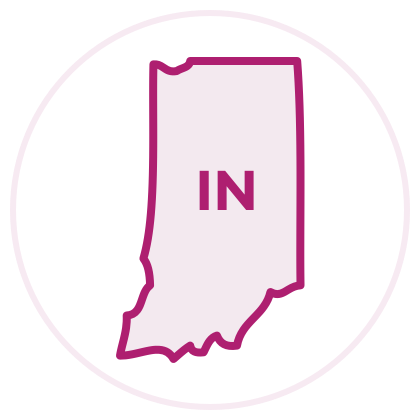Pre-Service Training
All prospective resource (foster) and adoptive parents must complete RAPT (Resource and Adoptive Parent Training). RAPT is divided into four sections. The first three parts must be completed by both resource and adoptive parents for a total of 10 hours. The fourth section is another 6 hours of training for families interested in adoption and must be completed by all families (including relative and kinship families) who are adopting child from the Indiana Department of Child Services (DCS).
Relative and kinship caregivers do not have to take any trainings prior to placement of a child in their home unless they intend to become a licensed home.
Services Offered Through the State’s Post-Permanency Support Program
The Indiana Department of Child Services (DCS) has a contract with Lifeline Youth and Family Services, Inc., to provide services statewide. Families may access services before finalization only if they have an open DCS case and receive a service referral from their DCS Family Case Manager or DCS Regional Adoption Consultant. Pre-finalization services are available for six months and can be extended if DCS, Lifeline staff, and families feel it is necessary. Families who have finalized their adoption or guardianship may self-refer for services. After finalization, if Lifeline and the family decide to open a case based on the assessment, services are available for a period of six months. This period may be extended, if needed.
Services include:
For more information, visit http://lifelineyouth.org/agss/ or http://indianaadoptionprogram.org
Geographic Area Covered
Services are offered statewide and Lifeline has offices in each region. Families must reside in Indiana to receive the services.
Eligible Population for the Overall Post-Permanency Program
Variations in Eligibility for the Post-Permanency Program
Families who have a child placed in their home through an open DCS case and have not yet finalized their adoption or guardianship of a child in Indiana’s care may be referred to Lifeline Youth and Family Services to receive pre-permanency support at the discretion of DCS.
Accessibility
Lifeline must be able to provide an interpreter or translation services when needed.
Outreach and Engagement
DCS ensures families receive information about Lifeline’s post-permanency services by providing pamphlets when a case finalizes and during pre-service training. DCS provides Lifeline with a list of new adoptive and guardianship families. Lifeline then sends a postcard to share information about the available services.
In addition, Lifeline promotes its post-permanency services on its website and on Facebook and LinkedIn.
How the Post-Permanency Program Is Operated
Notes About Who Provides Which Service(s)
Lifeline Youth and Family Services, Inc. provides all services.
Adoption/Guardianship Assistance/Subsidy Review and Changes
Guardianship and adoptive families can request a change by contacting their local DCS office no sooner than 12 months after the adoption assistance agreement is signed, or at least 12 months after the last modification has been made. Families need to make an official request using an official DCS form to the local county office in which the child’s case originated.
Tracking Adoption/Guardianship Discontinuity
Information not available
Post-Permanency Program Spending (FY 2023)
Information not available.
Funding Sources for the Post-Permanency Program (FY 2023)
Information not available.


